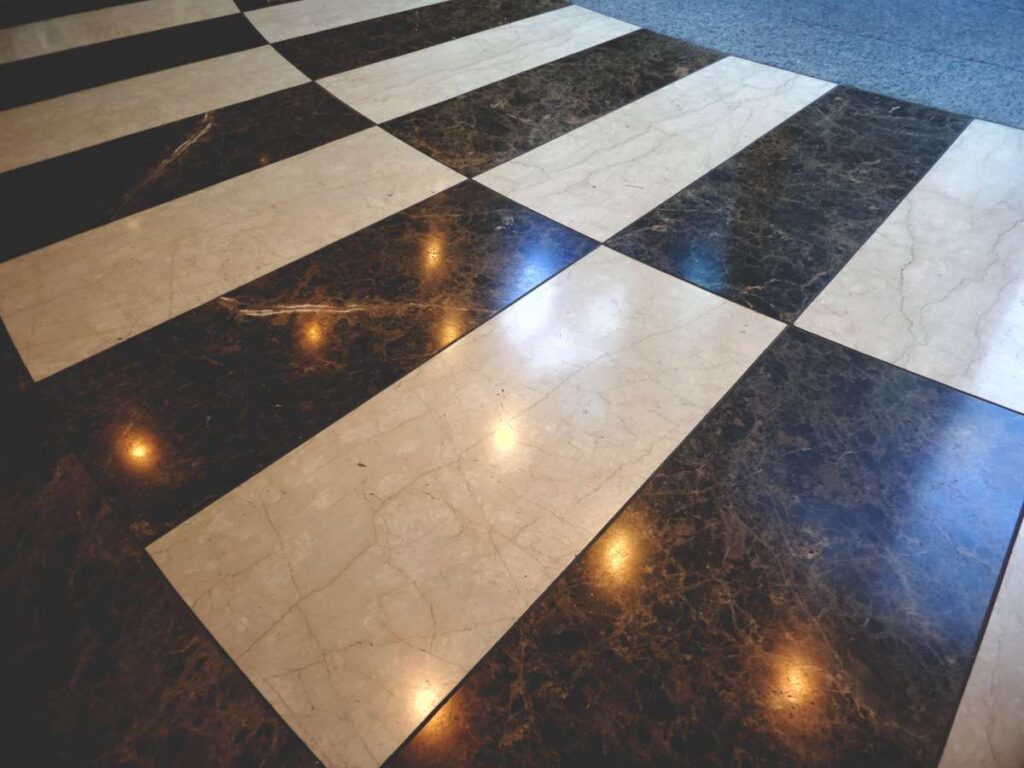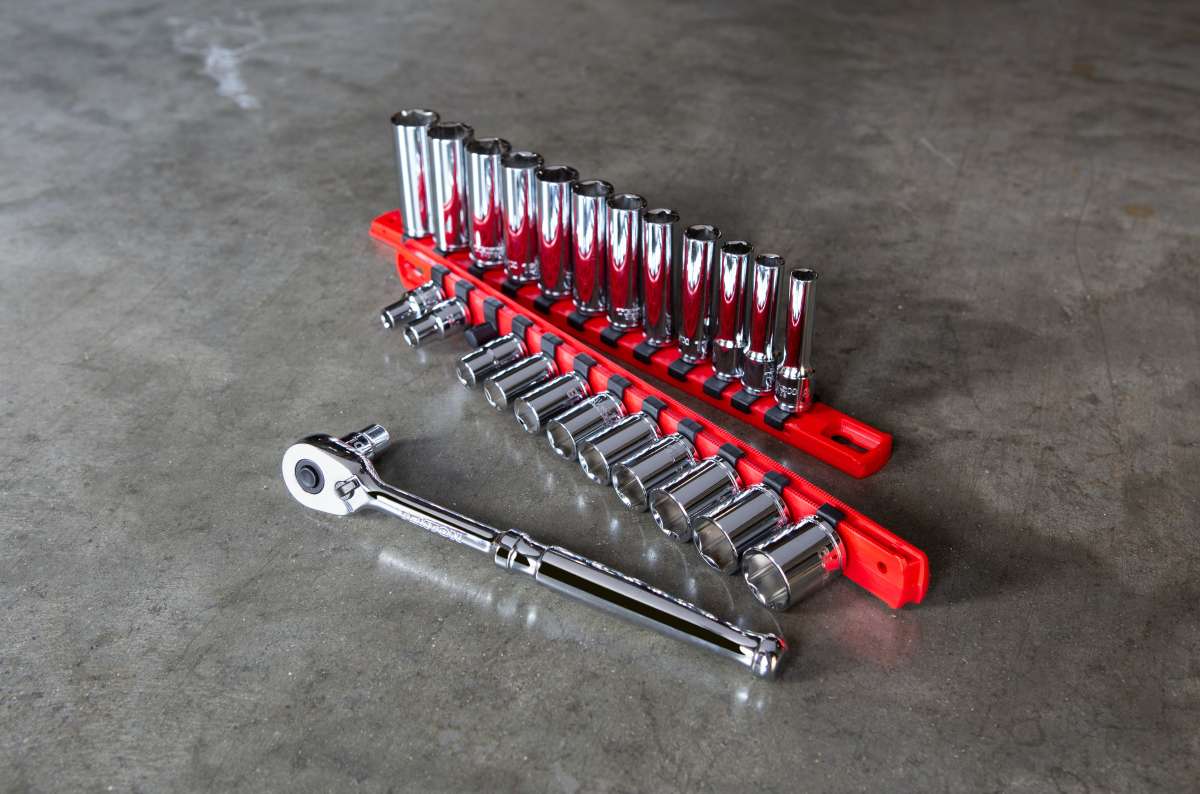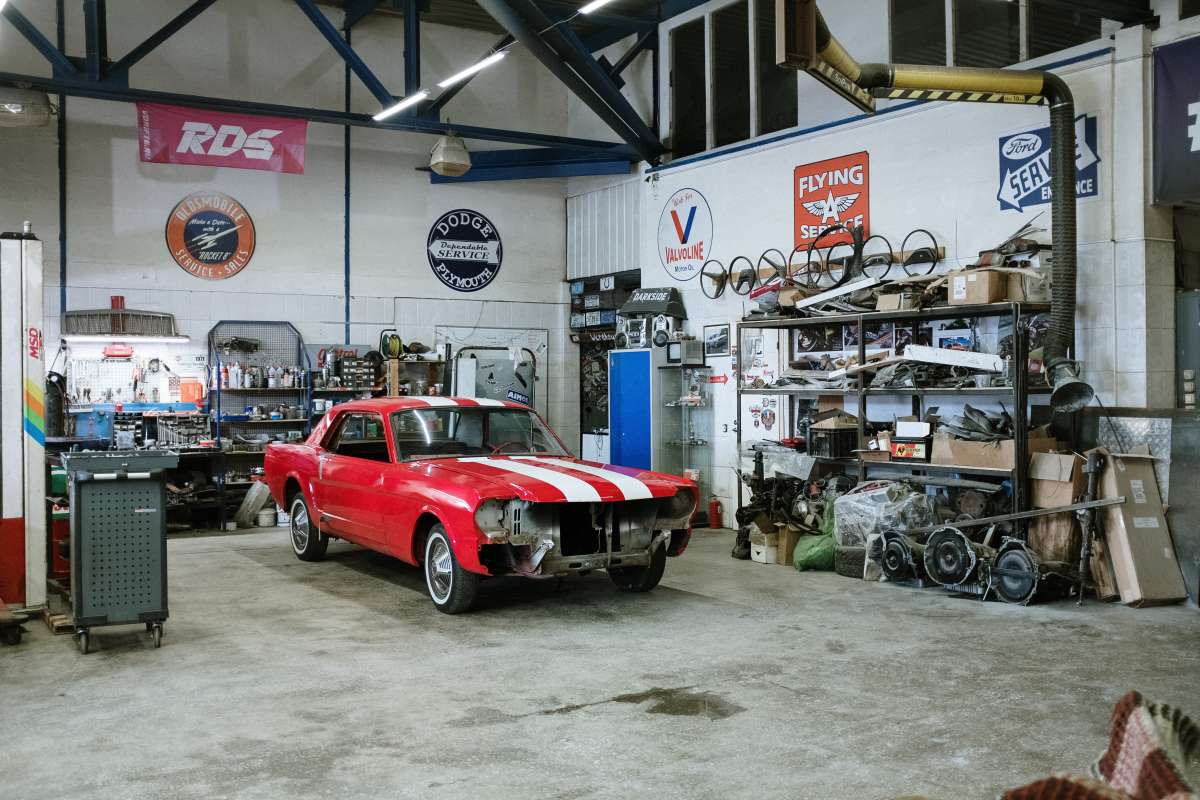One of the toughest and most durable finishes that you can apply to a garage floor today is an epoxy coating. Not only does it protect your garage floor, but it can also instantly transform your boring or ugly cement into a professional-looking floor of beauty and function. And since the garage is fast becoming more than just a place where you park the car, the benefits of garage floor epoxy have quickly made it one of the top choices for garage flooring today.
Used for both residential and commercial applications, epoxy will give your garage or shop floor that showroom shine that says “look at me”! Depending on which application you choose, you can select from a variety of understated solid colours and hues to custom colours and blends of colour flakes that match your style or even your favourite sports team.
It can be tough to find a floor solution that stands the test of time whole being chemical, spills and stain-resistant. Almost every type of flooring has some disadvantage or the other. And that’s one of the reasons as to why having stable shoes for walking on concrete is very important. An excellent choice for a variety of needs, epoxy floors seems to have fewer drawbacks and more benefits. However, examining both pros and cons of this material is a good idea if you’re considering installing it at home or work.
Whether you need to refurbish outdated flooring or seal your concrete surface, epoxy floor coating can transform your space while fortifying your flooring. This floor coating is surprisingly useful for preserving concrete surfaces and protecting against harsh impacts — all while showcasing a glossy finish.
Coating the floor of an auto shop, room, or garage has many benefits. Epoxy floor coating is resilient and seals your floor, bringing safety and beauty to any well-trafficked area. If your floor is uncoated and has been left open to damage, epoxy can shield your floor from any further damage and bring a level of professional refinement it may be lacking.
What Is Epoxy Floor Coating?
Epoxy is chemically different from normal floor paints. It is a combination of thermosetting resins and polymer hardeners. When mixed properly, the epoxy resin and hardeners react to each other in a way that results in a chemical bond with each compound and with the floor itself. The hardener is what gives epoxy its strength. The bond results in a stiff plastic that is durable. Since epoxy cures, unlike paint that dries, in a process that is called exothermic curing, it produces polymer structures that are cross-linked very closely, which is what makes it such a strong and durable material. This leaves you with a coating that is much thicker than paint and is excellent at bonding with a properly prepared surface.
Epoxy flooring is a surface that is made up of multiple epoxy layers that are applied to a floor. If it is at least 2 millimetres thick, it is considered epoxy flooring. If it is less than 2 millimetres, it is considered to be epoxy floor coating.
Epoxy floor coating is made of epoxide resin, polyamine hardener and other additives. When not used as a floor coating, it is often used as an adhesive. As it is mixed, it forms a chemical reaction that gives your floor distinct qualities. One of the most important qualities that this chemical reaction produces is new stability and endurance in the surface. This process seals and cures the surface it is applied to, forming a firm bond. Check out the advantages of epoxy floor coatings to determine if this is the right choice for your space.
Pros of Epoxy Floors:
Appearance
Compared to an average garage floor, epoxy floors are bright and professional. Their appearance alone makes them enticing to use. The smooth and even surface is also very easy to sweep and maintain. Since not much sticks to this type of flooring, cleaning up a mess a very easy.
Affordability
Compared to other types of flooring, the per square foot cost of epoxy floors are tough to beat. Since it can be installed directly over concrete and other flooring types, the installation costs are quite a bit lower than the others. Pricing remains one of the biggest and the most immediate advantages you’ll find with epoxy flooring.
Resistance
Epoxy floors are highly resistant to just about everything – oil, gasoline, bleach, transmission fluid, cleansers and more. This is one of the main reasons they’re frequently used in garages and within the automotive industry. Besides withstanding chemical spills/cleaners, epoxy floor coating is also heat and water-resistant. They are almost impervious to most chemical spills without any negative effects on the coating.
Another pro is that these floors also resistant to bacteria and germs, which makes them very easy to sanitize. This is why epoxy is an excellent choice for hospitals and clinics.
Durability
Distinctly valued for their durability, epoxy floors have a longer lifespan than many other floor types. Concrete is the only material that beats it, but it needs to be properly sealed and maintained. Besides, an epoxy floor coating required concrete beneath it anyway. Epoxy floor coating makes concrete exceptionally durable. They also offer benefits of anti-fatigue and can be easily rolled-out on the cement without mortar or glue. But if you wish to go that extra step to care for your floors, consider getting yourself epoxy resins for wood on wood improve.
Protective
Epoxy flooring protects the underlying concrete from moisture, stains, grease and cracks. In the long run, this can save you a great deal on cleaning and maintenance costs by eliminating the need to clean carpet or grout. It’s also very reasonably priced for the duration and level of protection that it offers.
However, the protective qualities of epoxy flooring depend on the installer. You need to find a quality local epoxy floorer. You can find epoxy flooring near me if this is a concern.
Longevity
Epoxy coating lasts longer than many types of flooring. When installed properly, it can last for several decades without cracking or peeling. Besides the durability, its lifespan makes it popular for commercial and industrial use.
Variety
Epoxy is a great choice to decorate your floors as well. It’s available in a variety of colours that add a flawless, smooth, elegant shine. The flooring can also be arranged into traditional or personalized patterns and designs. The number of choices makes it an economical way to upgrade plain concrete and improve the ambience of a home or office.
Safety
One of the lesser-known advantages of using epoxy on a garage floor is it enhances visibility inside the garage by reflecting light off the floor.
Cons of Epoxy Floors:
Temporary
One of the major disadvantages of using epoxy on your floors is that it’s a temporary flooring solution. Though durable and resistant, you will have to replace it eventually. Unlike some other flooring solutions, everyday wear and tear take its toll on epoxy floors. To keep things looking good, you’ll have to put down a new coat of epoxy. This is inevitable, especially if heavy things are dropped on the surface of the floor.
Cracks can develop, and chipping is a very common issue. Thought chips can start as a small annoyance. Eventually, they can lead to a large area of the coat peeling off of the floor. Wheeled carts and toolbox wheels also get caught catch as they are rolled over the damaged spot. The floor has to be repaired when this happens.
Slippery
Epoxy floors are relatively skid resistant. This con is not universal. It’s specific only to oil-covered epoxy since that can be very slippery. But they can also become very slippery when wet, which creates a dangerous situation. They are not a good choice in areas that may be prone to spills or water on the floor. This is another drawback. However, you can mitigate this risk, at least to some degree, if you’re able to texturize your floor.
Preparation
Getting the existing floors ready for applying epoxy is tedious. A significant amount of effort goes into it too. The concrete floor has to be clean and free of any grease, oil, or solvents before the epoxy coating is applied. Cracks will need to be filled as well. Cleaning concrete floors requires multiple attempts. All this preparation work required is a drawback.
The good news is that with the advancements in the manufacture and application methods, homeowners will find it relatively easy to apply using hand tools in a minimum amount of time.
Application
Apart from the extensive preparation that goes into getting the concrete ready, applying the epoxy coating is a time-consuming process. It also takes several days to dry properly. Additionally, the first coat of epoxy must dry completely before adding the next coat.
Smell
Wet epoxy has strong fumes. Darker shades of epoxy have more hardeners than the lighter shades. They tend to have an ammonia smell after applying.
Sensitivity
Epoxy flooring needs to be installed exactly according to directions. If not done properly, the flooring will not last as long as it should. The coating also gets scratched pretty easily. It’s very hard to clean paint overspray off of it. The coating should be applied only when during that time of the year when the humidity levels are low. This is because moisture can affect the durability of these floors.
We recommend using a dehumidifier to lower humidity for 24 hours before applying your first coat of resin. This will extract as much moisture from the air as possible, which will prevent moisture from becoming trapped underneath the floor once the resin finish has been applied.
Adherence
The concrete floor must be dried, prepared and cleaned thoroughly before applying epoxy to avoid adherence issues. Epoxy does not adhere well in a moist environment such as a basement. The epoxy paint peels off the floors if applied in a damp environment on a moist floor.
Moisture
Since the material doesn’t breathe once it cures, any moisture trapped below the surface can be a problem as it evaporates. It may lead to the eventual need for repair or refinishing as bubbling or buckling in the flooring material may occur in some cases.
Additional Costs
Homeowners have to buy special cleaning acids and other chemicals to ensure that the epoxy sticks. It’s also necessary to buy and use special protective clothing, protective eyewear and breathing devices when using these chemicals. Not only does this increase the amount of time and effort necessary, but in some instance, it can also increase costs.
Removal
Once the epoxy is applied, changing colours or designs can be a labour-intensive and costly endeavour. In those situations where the floor has to be repaired, removing the coating is quite extensive and difficult.
How Much Does It Cost to Epoxy a Garage Floor?
Depending on the size of your garage, the cost of installing a quality epoxy coating may be more reasonable than you think.
Several factors, such as: will determine the actual cost
- Your location and weather
- The condition of the current floor
- The quality of the epoxy used
- The labour rate of the installation contractor
- The size of your garage floor
Any additional specializations, such as texture, colour, or special effects.
There are some averages that can help you to at least have a starting point for determining if an epoxy floor coating is in your budget.
The cost of the epoxy
A price range of between $3 and $12 per square foot. For example, if your floor is 10 foot by 10 foot, would be 100 square feet, or $300 to $1200.
Depending on the variables above, some may be able to get a simple water-based epoxy coating in this price range, including labour. For more durable applications you will likely pay greater costs a more solid epoxy.
Labour costs
Here’s where the cost comes in, so if you’re the DIY type, you can save a good bit of money.
Abor is going to be the biggest part of the cost of an epoxy floor coating. In general, you’re going to get what you pay for so don’t go with the cheapest labour rate just to save money.
Other factors include design, use of specialized equipment, and the number of coats you decide to use.
Time
Unlike painting, an epoxy floor takes time to cure fully. This is necessary for the epoxy to be as durable as possible.
This means that you will need to stay off the floor for a few days.
The length of time is going to vary depending on the chemical composition of the epoxy, the number of coats you choose, and the weather. Curing is a drying process when the chemical reactions become complete. Therefore, the weather has an impact as well.
National Averages
Homeowners that have been willing to share their costs, report the average cost to apply an epoxy coating to a garage floor is $2,129 for a residential garage in the United States (source). This includes both one and two-car garages.
Your cost will vary depending on the factors discussed above.
Should you be using it for your garage flooring?
Whether or not you should be using the epoxy is ultimately up to you and how you plan on using the garage flooring space. For example, home mechanics and hobbyists tend to give epoxy flooring high praise for its smooth, reflective surface that tends to brighten up the garage space and give it a lively ambience. It is also ideal for easy cleaning up spilled oil, brake fluid and anti-freeze and won’t take a toll on the flooring itself since it is very resistant. The following are some advantages and disadvantages that come with epoxy flooring for garages to help you determine if epoxy flooring makes sense for your home garage or commercial garage space.
Should I Apply Epoxy Myself or Go with the Pros?
Even experienced DIYers find the epoxy application process challenging. First, the flooring must be prepared in advance, and cracks or damaged areas need to be sealed or fixed. This essential process requires special equipment that the average homeowner might not have, and the epoxy may not adhere correctly if the area is not prepared adequately.
Secondly, epoxy doesn’t work on all types of concrete. If you aren’t sure what type of concrete you have, your floor has been previously sealed, or moisture is coming up through your floor, you shouldn’t apply epoxy. You can epoxy a painted floor. However, you’ll need to remove the paint before the epoxy is applied.
Regardless of whether you choose to DIY or hire a company that specializes in residential floor coatings, you’ll still need to clean out your garage. The project could last up to five days, so you will need a place to store your belongings during the application and curing process. You also have to wait for a warm, dry day with temperatures between 60 and 90 degrees Fahrenheit to apply the coating.
If you decide to apply the epoxy yourself, the next step is to clean your garage floor thoroughly. Stains and debris can be removed using concrete cleaner but should be vacuumed up to ensure that the product doesn’t get into the sewer. After vacuuming, spray out the garage with a hose and carefully apply an acid/water solution following all safety precautions. Finally, rinse the floor again and let it dry overnight.
Once your floor is ready, you can start applying the epoxy. You’ll need to choose between the three main types of epoxy—solid, water-based, and solvent-based—and apply two coats. Be sure to use safety gear such as gloves, boot, goggles, and a respirator, and follow all of the instructions precisely.
When reviewing the different epoxy options available, the best garage floor epoxy is going to be a 100% solids multi-coat system. Though it is the more expensive option for a floor covering, it is arguably one of the most economical of installations when compared throughout the floor.
Whether you are turning your garage into a showpiece for storage and cars or just want something to protect your garage for years to come, a good system such as this will last years and give you one of the best returns for the dollar.


